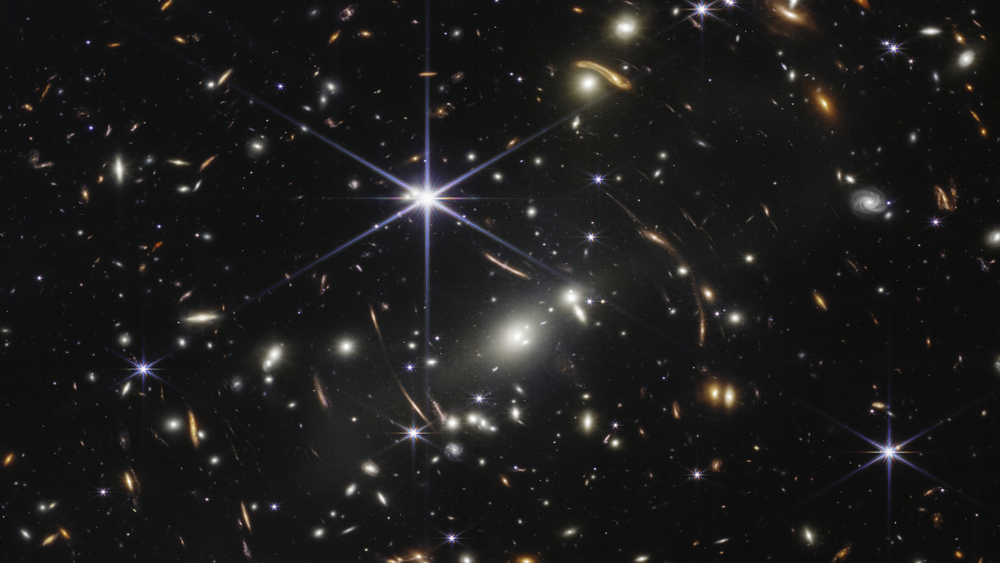Recently, a team of scientists released data collected from 800,000 galaxies at different distances from Earth, all lying within the same narrow slice of the sky. Conventional scientists believe the data from this COSMOS-Web survey, obtained by the James Webb Space Telescope (JWST), will enable them to see how galaxies evolved over time. Yet these data from the COSMOS-Web survey are “challenging” to naturalistic theories of the early universe.1
Distant galaxies are billions of light-years away, and Big Bang astronomers think the universe is 13.8 billion years old. So, not too surprisingly, they assume that light from the most distant galaxies took almost 13.8 billion years to reach Earth. Although this may sound reasonable, creation scientists think this assumption is open to challenge.2 In any case, by Big Bang reckoning, we should be seeing these very distant galaxies, not as they are now, but as they were eons ago. Since they assume it took many millions of years for stars and galaxies to form naturally, conventional astronomers were expecting to see very few galaxies in the “early” universe, and they expected that any existing galaxies would appear immature and unevolved. But these expectations continue to be routinely contradicted. University of California Santa Barbara physicist Caitlin Casey, one of the leaders of the COSMOS-Web effort, said,
“It makes sense – the Big Bang happens and things take time to gravitationally collapse and form, and for stars to turn on. There’s a timescale associated with that....And the big surprise is that with JWST, we see roughly 10 times more galaxies than expected at these incredible distances. We’re also seeing supermassive black holes that are not even visible with Hubble.”1
Of course, the Lord Jesus was free to create however many galaxies pleased Him at whatever distances pleased Him. He was certainly under no constraint to create galaxies in accordance with Big Bang expectations. So biblical creationists should not be surprised that astronomical observations continue to contradict Big Bang theory predictions.
Previous Creation Science Update articles have documented how distant, mature galaxies are problematic for the Big Bang3–5 and how data from the James Webb Space Telescope are making the situation even worse.6,7 It is so bad that one physicist suggested resolving the issue by doubling the universe’s age!8
Big Bang problems continue to mount, and even some conventional sources occasionally suggest that the Big Bang is in serious trouble.9 Despite the futile attempts of some to explain our universe apart from our Creator, the heavens are still a testimony to God’s glory.10
References
- Fernandez, S. Largest Map of the Universe Announced Revealing 800,000 Galaxies, Challenging Early Cosmos Theories. Phys.org. Posted on phys.org June 5, 2025, accessed June 6, 2025.
- See for instance, Dennis, P. 2018. Consistent Young Earth Relativistic Cosmology. Proceedings of the International Conference on Creationism. 8, article 23: 14–35.
- Thomas, B. 2011. ‘Old’ Galaxy Found in ‘Young’ Part of the Universe. Creation Science Update. Posted on ICR.org May 24, 2011, accessed August 22, 2022.
- Hebert, J. 2020. ‘Early’ Spiral Galaxy Surprise. Creation Science Update. Posted on ICR.org May 1, 2020, accessed August 22, 2022.
- Hebert, J. 2020. Most Distant Rotating Disk Galaxy Challenges Secular Models. Creation Science Update. Posted on ICR.org May 28, 2020, accessed August 22, 2022.
- Hebert, J. 2022. James Webb Telescope vs. the Big Bang. Acts & Facts 51 (11): 14–17. 7.
- Hebert, J. 2023. Webb Telescope Continues to Challenge Big Bang. Creation Science Update. Posted on ICR.org January 26, 2023, accessed June 6, 2025.
- Hebert, J. Big Bang Troubles? No Problem Just Double the Universe’s Age! Creation Science Update. Posted on ICR.org July 31, 2023, accessed June 6, 2025.
- Hebert, J. New York Times Editorial: Big Bang Unraveling? Creation Science Update. Posted on ICR.org September 14, 2023, accessed June 6, 2025.
- Genesis 1; Psalm 19:1–2; John 1:1–2; and Colossians 1:16.
* Dr. Jake Hebert is a research associate at the Institute for Creation Research and earned his Ph.D. in physics from the University of Texas at Dallas.
Image Credit: Public Domain, NASA, ESA, CSA, and STScI














